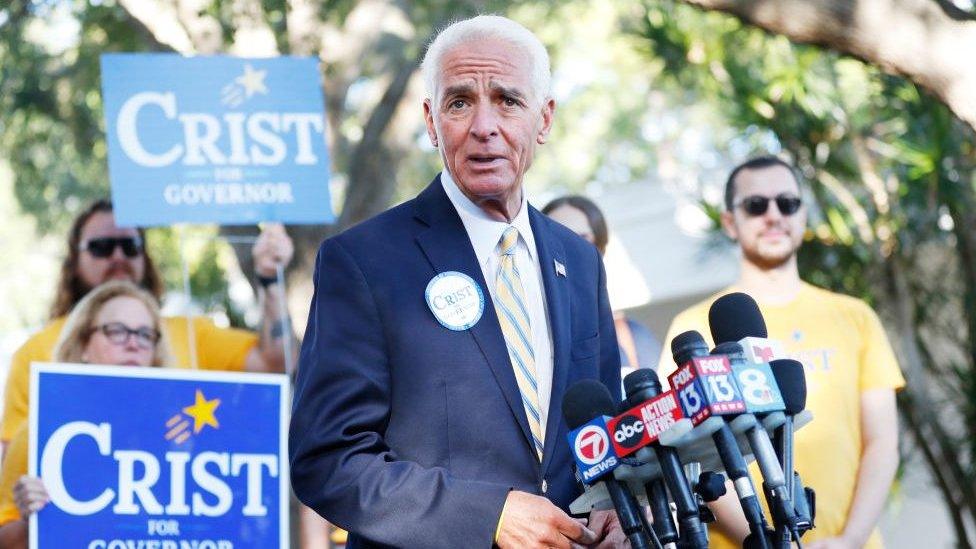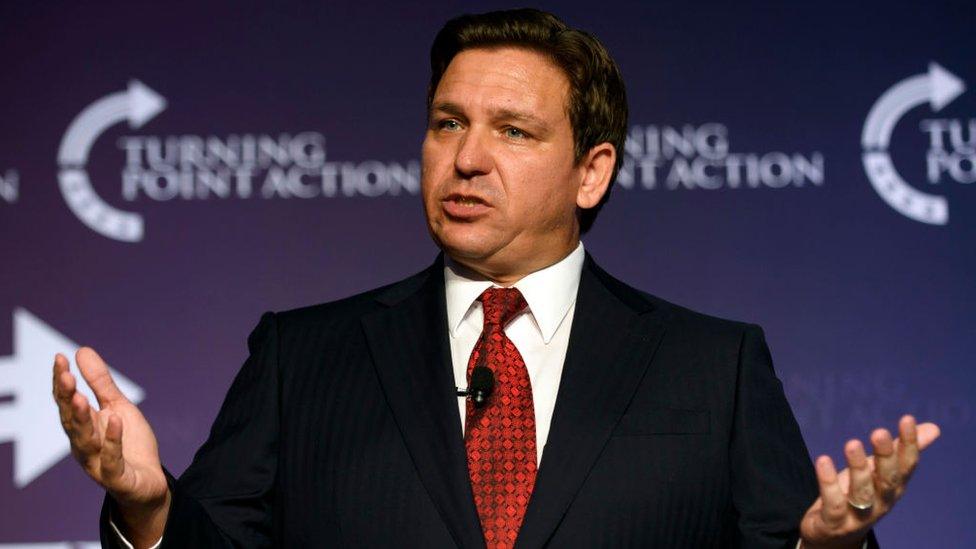Charlie Crist: Florida Democrats pick challenger to Ron DeSantis
- Published

Charlie Crist is a former Republican before he switched parties in 2012
Democratic voters have picked congressman Charlie Crist to take on Florida's Republican Governor Ron DeSantis in the midterm elections.
Mr Crist beat the state's agriculture commissioner, Nikki Fried, in the last big election day before November's vote.
Democrats are eager to eclipse rising star Mr DeSantis amid expectations he will run for the White House in 2024.
Voters in New York and Oklahoma also picked candidates on Tuesday.
The midterms will determine control of Congress for the final two years of Democratic President Joe Biden's term.
In New York state, Democrat Pat Ryan defeated Republican Marc Molinaro in a special election for an open US House seat. That race could prove a bellwether for the midterms.
According to opinion polls Mr Crist is currently trailing Mr DeSantis by a few percentage points in Florida, a crucial swing state in presidential elections that has grown steadily more Republican during the governor's tenure.
Mr Crist was formerly a Republican who served a single term as the state's governor before switching parties in 2012.

Ron DeSantis has been hailed as a conservative rockstar
"Tonight, the people of Florida clearly sent a message: they want a governor who cares about them and solves real problems, preserves our freedom, not a bully who divides us and takes our freedom away," Mr Crist declared in reference to Mr DeSantis.
At his victory party in a Miami-area ballroom, Mr DeSantis hit back: "We will never ever surrender to the woke agenda. Florida is a state where woke goes to die."
The Republican won his first election in 2018 by less than half a percentage point, and has since become one of the most admired governors in the country among the party faithful.
With his fierce opposition to mask and vaccine mandates during the coronavirus pandemic and his refusal to back down on culture war flashpoints from abortion to education, he is widely seen by Republicans as a natural successor to former President Donald Trump.

A confident mood at DeSantis HQ

The party is kicking off at Ron DeSantis' headquarters in Hialeah, Florida.
That it would be a victory party was preordained - the incumbent governor was running unopposed for the Republican nomination in November. Instead, the event is giving his fellow politicians a chance to make their pitch to conservative donors and supporters.
"The battle starts tonight," said congressman Mario Diaz-Balart, pledging that Republicans would send Democrats in the House and Senate "packing" in the midterms.
While the demographics of the Republican coalition in recent elections have been overwhelmingly white, the crowd of supporters at an art centre here in Hialeah - a predominantly Cuban community near Miami - is diverse. Many fled from communist dictatorships, and have taken their distrust of "socialism" and the political left with them to their new home.
Brian Tam and Liem Bui emigrated from Vietnam. They say they're dedicated DeSantis supporters who would love to see him run for president one day, although Mr Tam adds that he'd prefer that Mr Trump run again - with Mr DeSantis as his vice-president.

Mr DeSantis and Mr Trump have been circling each other warily ahead of the looming battle to see who will be crowned as the Republican nominee for the White House race of 2024.
On Tuesday, Florida Democratic voters also chose Val Demings, a congresswoman and former Orlando police chief, to take on Republican Senator Marco Rubio, a former presidential hopeful, in November.
Most opinion polls show Mr Rubio with a firm lead so far. Like Mr DeSantis, he ran unopposed in his primary.
Florida Republican congressman and Trump loyalist Matt Gaetz also cruised to victory on Tuesday, despite facing a federal sex-trafficking investigation.
Democrats have been on the defensive up until now in this election season, with their party's prospects complicated by President Biden's low approval ratings, inflation and historical political gravity.
Republicans still sound optimistic that they can wrest control of the US House of Representatives this autumn.
But their hopes of winning the Senate have been tempered as Trump-endorsed candidates fight to gain traction in Pennsylvania, Georgia, Arizona and Ohio.
Anger over the Supreme Court's decision in June to roll back abortion rights may also drive voters to back Democrats. The party has seen a boost in donations since the court's conservative majority opened the door for individual states to ban or severely restrict the procedure.
Republican attacks, meanwhile, have largely focused on the economy with inflation high and the cost of living at the forefront of many voters' minds.
On Tuesday, New York saw several other high-profile primary contests, including a cut-throat fight between two of the Democratic party's most powerful congressional committee chiefs: Jerry Nadler beat Carolyn Maloney in a newly merged district in Manhattan.
Incumbent congressman Sean Patrick Maloney comfortably fended off left-wing challenger Alessandra Biaggi in suburban New York.
In Oklahoma, meanwhile, Trump-endorsed congressman Markwayne Mullin defeated the former speaker of the state legislature in a Republican primary to fill the seat of the state's retiring US senator.